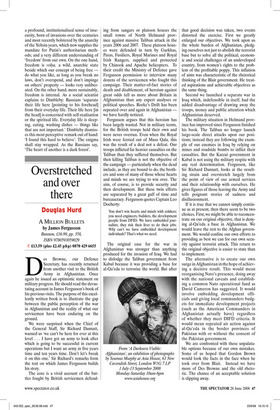Overstretched and over there
Douglas Hurd
A MILLION BULLETS by James Fergusson Bantam, £16.99, pp. 358, ISBN 9780593059029 ✆ £13.59 (plus £2.45 p&p) 0870 429 6655 Des Browne, our Defence Secretary, has recently returned from another visit to the British Army in Afghanistan. Once again he issued an optimistic statement on military progress. He should read the devastating account in James Fergusson’s book of his previous visits. The purpose of this excellently written book is to illustrate the gap between the public perception of the war in Afghanistan and the reality of what our servicemen have been enduring on the ground.
We were surprised when the Chief of the General Staff, Sir Richard Dannatt, warned us ‘we can’t be here for ever at this level . . . I have got an army to look after which is going to be successful in current operations but I want an army in five years time and ten years time. Don’t let’s break it on this one.’ Sir Richard’s remarks form the text on which James Fergusson builds his story.
The core is a vivid account of the battles fought by British servicemen defend ing from sangars or platoon houses the small towns of North Helmand province against massive Taliban attack in the years 2006 and 2007. These platoon houses were defended in turn by Gurkhas, Paras, Fusiliers, Royal Marines and Royal Irish Rangers, supplied and protected by Chinook and Apache helicopters. To their credit the Ministry of Defence gave Fergusson permission to interview many dozens of the servicemen who fought this campaign. Their matter-of-fact stories of death and disablement, of heroism against great odds tell us more about Britain in Afghanistan than any expert analyses or political speeches. Rorke’s Drift has been repeated over and again in Afghanistan — we have hardly noticed.
Fergusson argues that this heroism has been largely wasted. Not in military terms, for the British troops held their own and were never overrun. Even when the Royal Irish were ferried out of Musa Qala, this was the result of a deal not a defeat. Our troops inflicted far heavier casualties on the Taliban than they suffered themselves. But then killing Taliban is not the objective of the campaign — particularly when the dead include, as they are bound to do, the brothers and sons of many of those whose hearts and minds we are trying to win over. The aim, of course, is to provide security and then development. But these twin efforts are separated by a great gulf of time and bureaucracy. Fergusson quotes Captain Leo Docherty:
You don’t win hearts and minds with soldiers; you need engineers, builders, the development people from DFID. We have embedded journalists; they risk their lives to do their jobs. Why can’t we have embedded development individuals? That’s what we need.
The original case for the war in Afghanistan was stronger than anything produced for the invasion of Iraq. We had to dislodge the Taliban government from Kabul because it was providing a base for al-Qa’eda to terrorise the world. But after that good decision was taken, two events distorted the exercise. First we greatly enlarged our objectives. We took upon us the whole burden of Afghanistan, pledging ourselves not just to abolish the terrorist base but to solve all the political, economic and social challenges of an undeveloped country, from women’s rights to the problem of the profitable poppy. This inflation of aims was characteristic of the rhetorical thinking of the Blair government. He treated aspirations and achievable objectives as the same thing.
Second we launched a separate war in Iraq which, indefensible in itself, had the added disadvantage of drawing away the troops, money and public attention which Afghanistan deserved.
The military situation in Helmand province has improved since Fergusson finished his book. The Taliban no longer launch large-scale direct attacks upon our positions; instead they are following the example of our enemies in Iraq by relying on mines and roadside bombs to inflict their casualties. But the Karzai government in Kabul is not using the military respite with any real determination. Fergusson, like Sir Richard Dannatt, looks at the resulting strain and overstretch largely from the point of view of our armed services and their relationship with ourselves. He gives figures of those leaving the Army and tells poignant stories of sadness and disillusionment.
If it is true that we cannot simply continue as at present, then there seem to be two choices. First, we might be able to reconcentrate on our original objective, that is denying al-Qa’eda a base in Afghanistan. We would leave the rest to the Afghan government. We would confine our own efforts to providing as best we can for our own security against terrorist attack. This return to the original objective is easier to state than to implement.
The alternative is to create our own surge in Afghanistan in the hope of achieving a decisive result. This would mean reorganising Nato’s presence, doing away with the national caveats and establishing a common Nato operational fund as David Cameron has suggested. It would involve embedding development officials and giving local commanders budgets for immediate development projects (such as the American Commanders in Afghanistan actually have) regardless of whether they meet DIFD criteria. It would mean repeated air action against al-Qa’eda in the border provinces of Pakistan with or without the consent of the Pakistan government.
We are confronted with these unpalatable options because of our own mistakes. Some of us hoped that Gordon Brown would look the facts in the face when he took over from Blair. Instead we have more of Des Browne and the old rhetoric. The chance of an acceptable solution is slipping away.


















































































 Previous page
Previous page